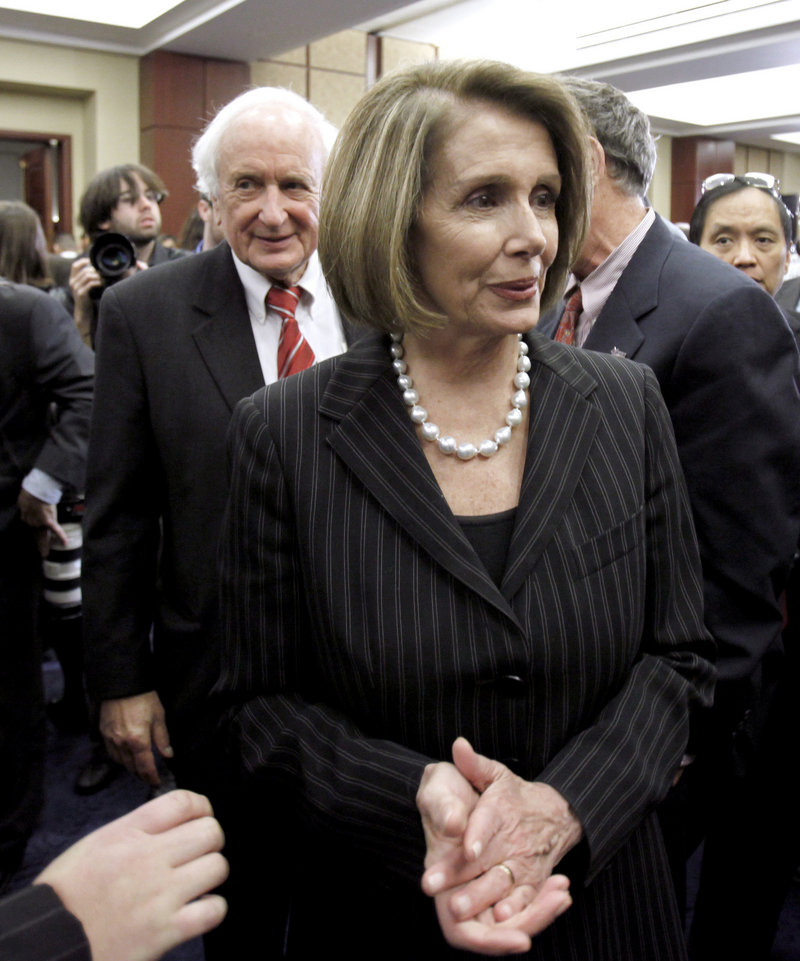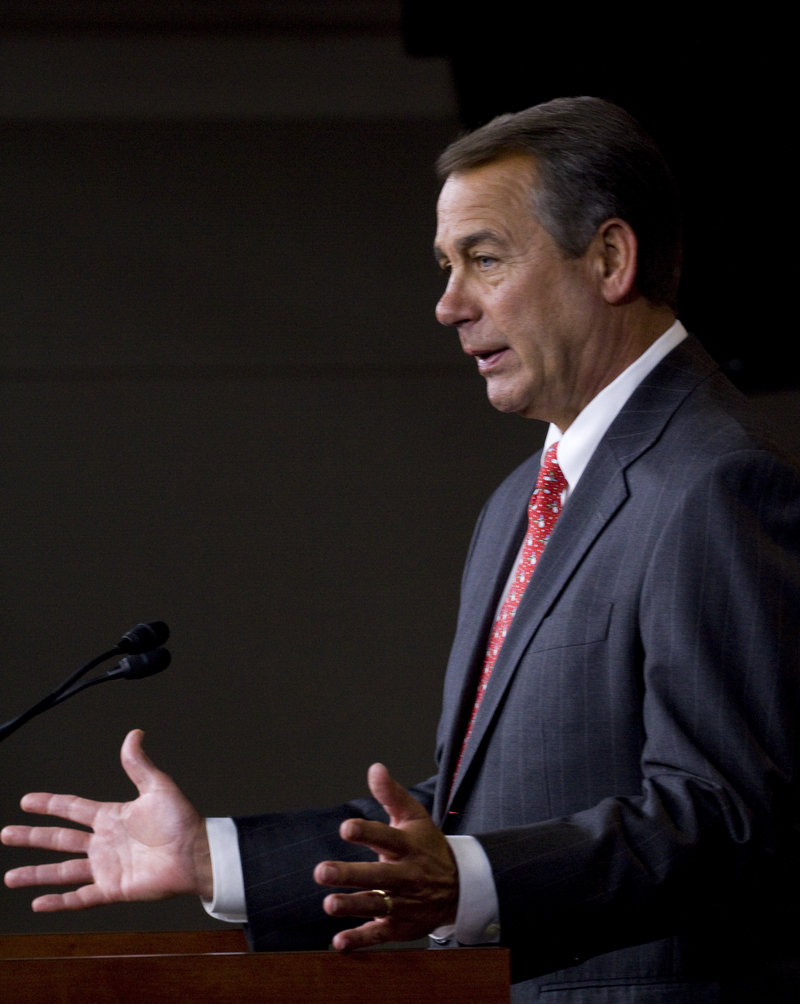WASHINGTON – Nancy Pelosi, D-Calif., brought camera crews and dignitaries into her childhood Baltimore neighborhood where a street was being renamed in her honor, while John Boehner, R-Ohio, is bringing his 11 siblings to Washington for a private reunion. Pelosi was feted at the Italian Embassy as Tony Bennett sang “I Left My Heart in San Francisco.” Her successor was invited to the posh W Hotel for a LeAnn Rimes concert, but he is planning to skip it.
Austerity is the theme of Boehner’s ascendancy to House speaker this week, placing the start of this new Congress in stark contrast to the more lavish festivities that accompanied Pelosi’s swearing-in four years ago.
On Wednesday, following a bipartisan prayer service at St. Peter’s Catholic Church, Boehner will recite the oath and take the gavel from Pelosi with the attendant pomp and no more — except, perhaps, a few tears.
Then Boehner, 61, will deliver his maiden speech to the new House, which includes a huge cadre of freshman lawmakers. Many are Republicans who sailed into Washington with the tea party winds and are determined to use their majority to undo President Obama’s legislative record.
In his speech, Boehner intends to survey the difficult choices facing the country and pledge to “listen to the American people” and to reform the way the House has operated in the past under control of both parties, according to a GOP leadership aide.
“The American people want a smaller, more accountable government. And starting Wednesday, the House of Representatives will be the American people’s outpost in Washington, D.C.,” Boehner said.
“We are going to fight for their priorities: cutting spending, repealing the job-killing health care law and helping get our economy moving again.”
Although Boehner has been steering clear of overtly partisan rhetoric, his lieutenants were strident in a string of television appearances Sunday.
Rep. Fred Upton, R-Mich., the incoming chairman of the House Energy and Commerce Committee, said Republicans would hold a vote on repealing the health care law before President Obama delivers his State of the Union address later this month. Upton said disenchantment with the law is so pervasive in the new House that they could reach the two-thirds threshold to overturn a likely presidential veto.
Yet for all of the GOP’s ambitions, Democrats still control the Senate and Obama can veto any bill that passes Congress. Democrats have said they’re eager to reach common ground with House Republicans, but they also plan to fiercely defend Obama’s achievements of the past two years, chief among them the health care overhaul.
In a departure from earlier takeovers, Republicans are not planning a blitz of new legislation in the first few days.
Rather, aides said, there will be a full reading aloud of the Constitution on Thursday, and likely a vote this week to cut congressional office spending by 5 percent — both symbolic gestures designed to set a tone for how Republicans plan to govern.
“The problems facing us aren’t things that will be solved in the first 100 hours,” said Republican strategist David Winston, a close adviser to Boehner. He was referring to the “100 Hours” agenda following Pelosi’s 2007 swearing-in during which Democrats raised the minimum wage, funded stem-cell research and passed a flurry of other bills.
“How will you solve jobs and the economy?” Winston added. “What are you going to do with health care? The scope of spending and the deficit? These are big structural problems.”
The new Congress will renew the long debate over the nation’s deficit, with a vote expected as early as March over whether to raise the debt ceiling, allowing the government to keep borrowing money.
The issue resonated on the campaign trail last fall, and newly elected Republicans were torn on it Sunday. Rep.-elect Allen West, R-Fla., said he could support raising the debt limit if there were also spending caps and changes to entitlement programs like Social Security. But Rep.-elect Mike Kelly, R-Pa., said raising the debt ceiling at all would be “absolutely irresponsible.”
House Democrats, meanwhile, are girding for early skirmishes with the new GOP majority. Pelosi, who is becoming minority leader and will also give a speech Wednesday outlining her party’s agenda, plans to meet with her diminished caucus Tuesday night to plot strategy against the Republicans’ health care repeal effort, which aides said could begin as early as this week.
Democrats also plan to challenge some of the new Republican House rules, including one that effectively replaces the Democrats’ “pay-as-you-go” rule with a requirement that any increase in mandatory spending be matched not by tax increases but only by a spending cut of equal or greater value elsewhere in the budget.
“We’re certainly going to be busy and pushing back against their rules package and their plans to repeal health care reform,” said a Democratic House leadership aide who spoke on the condition of anonymity. “The first week of a new Congress, you really have trouble breaking through when you’re in the minority, especially when there’s a new speaker and so many new freshmen.”
Most of the week’s attention will be focused on the House, but the Senate could touch off a bitter fight of its own.
First-term Senate Democrats are likely to assert themselves beginning Wednesday with a push to change the chamber’s rules, which the Republican minority has used effectively to filibuster or otherwise block legislation with majority support.
Republicans’ use of procedural blockades has been a source of frustration for many Democratic senators, although some of the party’s longer-serving members have cautioned against tinkering with rules that were designed long ago to protect the rights of the minority party.
Vice President Joe Biden, acting in his role as president of the Senate, will swear in 13 new senators Wednesday. Their arrival shrinks the majority enjoyed by Democrats and independents to 53-47, further complicating efforts by Senate Majority Leader Harry Reid, D-Nev., to reach the 60-vote threshold necessary to overcome filibuster threats.
In the House, Boehner’s transition has been notable for its lack of the triumphant tone of the Pelosi transition, as well as that of then-Speaker Newt Gingrich, R-Ga., in 1995.
Boehner has avoided the media spotlight, making only a handful of public appearances since November’s election and granting two major interviews, including one with CBS’ “60 Minutes” that focused on his working-class roots in Ohio.
Advisers said Boehner is avoiding any effort to make himself the singular face and voice of the new Republican majority, preferring to make the moment about his party and its ideas.
“Boehner’s just a very different guy in this regard,” Winston said. “He’s making it more about policy and issues rather than him and the new majority.”
Send questions/comments to the editors.




Success. Please wait for the page to reload. If the page does not reload within 5 seconds, please refresh the page.
Enter your email and password to access comments.
Hi, to comment on stories you must . This profile is in addition to your subscription and website login.
Already have a commenting profile? .
Invalid username/password.
Please check your email to confirm and complete your registration.
Only subscribers are eligible to post comments. Please subscribe or login first for digital access. Here’s why.
Use the form below to reset your password. When you've submitted your account email, we will send an email with a reset code.